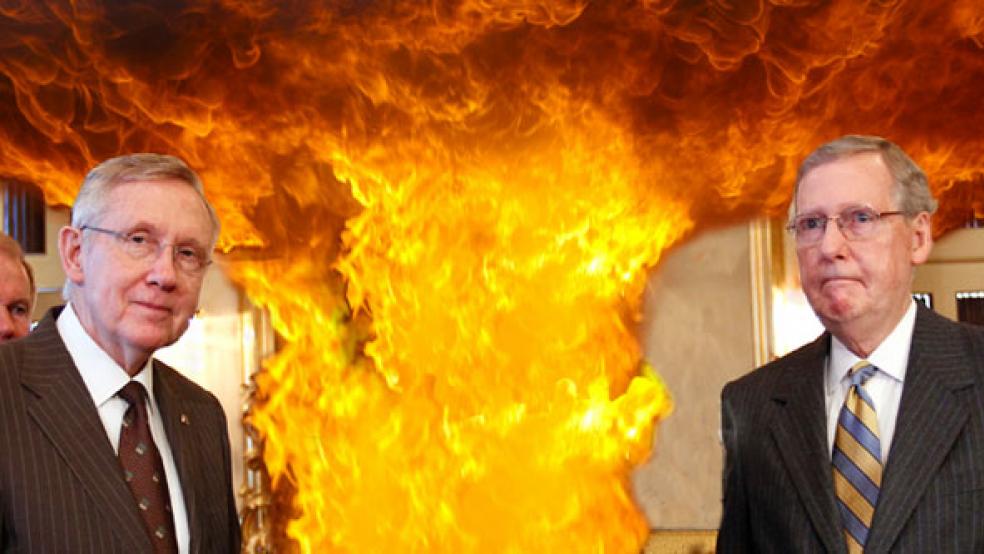Stuck on a path of mutually assured gridlock, Senate Majority Leader Harry Reid (D-NV) gave his Republican colleagues today an ultimatum on filibustering presidential nominees – either abandon their tactics and allow key nominations to go through or suffer the consequences of all out political warfare.

Reid says that GOP lawmakers have twisted the filibuster into a weapon of “obstruct and delay,” as a number of President Obama’s nominees have been blocked by filibuster threats.
Only a 60-vote supermajority can end a filibuster, but Senate Democrats are prepared to let any nominees for an executive branch agency get through the confirmation process with a simple majority of 51 votes. At a rare closed session scheduled for 6 pm on Monday in the old Senate chambers, Reid will lay out the options for Senate Republicans.
Either the filibuster gets removed on non-judicial nominees, or they must allow a floor vote scheduled on Tuesday for seven stalled nominations—including the heads of the Environmental Protection Agency, the Labor Department, and the Consumer Financial Protection Bureau. While most rule changes require 67 votes, Democrats plan to force this through with a simple majority.
This permanent change to Senate rules would “save” the chamber “from becoming obsolete,” Reid said in an appearance at the Center for American Progress, a liberal think tank affiliated with Democrats.
“The Senate must evolve to meet the challenges of modern-day America,” Reid said. “I love the Senate, but the Senate is broken and needs to be fixed.”
The Nevada Democrat claimed his ultimatum is “no big deal,” because it doesn’t apply to legislation or judicial nominations. But Senate Minority Leader Mitch McConnell (R-KY) has equated it to a nuclear option that changes the “core of the Senate.”
Here’s what you need to know about the big showdown on Capitol Hill:
The Problem Has Been Getting Worse Presidential nominees have not always had to sweat cloture motions. So McConnell is hyperbolizing about the character of the Senate being changed. This is nowhere near as transformative for the chamber as the 17th Amendment passed 100 years ago in 1913 mandating that senators be elected, rather than appointed by state legislatures.
Not one motion for cloture on a nominee happened between 1949 and 1966, according to a June report by the Congressional Research Service. Just 12 motions occurred from 1967 to 1992. The uptick only really started in 2003, when the rule began to mutate during the president of George W. Bush.
There were a stunning 33 motions in the recently ended 112th Congress, which covered 2011 to 2012. So even if the filibuster is a basic element of the Senate, it only began to mutate during the presidency of George W. Bush when Democrats started to deploy the tactic.
Why Is McConnell So Worried? Both Reid and McConnell have flip-flopped on this particular issue. Why? Because the Senate minority gets a check on the administration’s power by having the ability to filibuster a nominee. Their position usually depends on who is sitting in the Oval Office.
McConnell argues that the filibuster merely facilitates “debate.” More importantly, Obama has largely gotten what he wanted thus far.
“Rather than getting down in the weeds on the rules, what is the problem here?” McConnell said Sunday on NBC’s “Meet the Press.” “The president has had 1,540 of his nominations confirmed; only four defeated. He's not lost a single member of the cabinet. He's getting them faster than President Bush was at the same time in his second term. The majority leader needs to bring these nominees up; most of them are going to be confirmed.”




